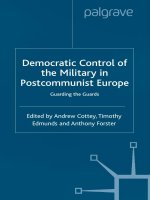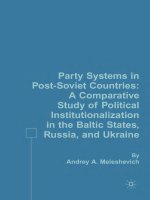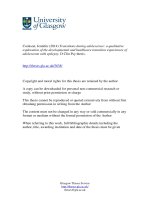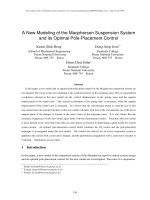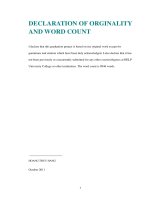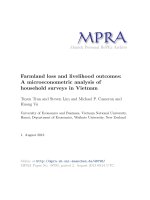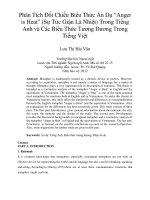cottey a., edmunds t., forster a. femocratic control of the military in postcommunist europe. guarding the guards. 2002
Bạn đang xem bản rút gọn của tài liệu. Xem và tải ngay bản đầy đủ của tài liệu tại đây (837.13 KB, 287 trang )
Edited by Andrew Cottey, Timothy
Edmunds and Anthony Forster
Democratic Control of
the Military in
Postcommunist Europe
Guarding the Guards
Democratic Control of the Military
in Postcommunist Europe
DCMPR 10/18/01 5:18 PM Page i
One Europe or Several?
Series Editor: Helen Wallace
The One Europe or Several? series examines contemporary processes of political,
security, economic, social and cultural change across the European continent, as
well as issues of convergence/divergence and prospects for integration and frag-
mentation. Many of the books in the series are cross-country comparisons; others
evaluate the European institutions, in particular the European Union and NATO,
in the context of eastern enlargement.
Titles include:
Andrew Cottey, Timothy Edmunds and Anthony Forster (editors)
DEMOCRATIC CONTROL OF THE MILITARY IN POSTCOMMUNIST EUROPE
Guarding the Guards
Helen Wallace (editor)
INTERLOCKING DIMENSIONS OF EUROPEAN INTEGRATION
One Europe or Several?
Series Standing Order ISBN 0–333–94630–8
(outside North America only)
You can receive future titles in this series as they are published by placing a standing order.
Please contact your bookseller or, in case of difficulty, write to us at the address below with
your name and address, the title of the series and the ISBN quoted above.
Customer Services Department, Macmillan Distribution Ltd, Houndmills, Basingstoke,
Hampshire RG21 6XS, England
DCMPR 10/18/01 5:18 PM Page ii
Democratic Control
of the Military in
Postcommunist Europe
Guarding the Guards
Edited by
Andrew Cottey
Department of Government, University College Cork/
Department of Peace Studies, University of Bradford
Timothy Edmunds
Defence Studies Department
King’s College London / Joint Services Command and Staff College
and
Anthony Forster
Defence Studies Department
King’s College London / Joint Services Command and Staff College
DCMPR 10/18/01 5:18 PM Page iii
Selection and editorial matter and chapters 1 and 14 © Andrew Cottey,
Timothy Edmunds and Anthony Forster 2002
Chapters 2–13 © Palgrave Publishers Ltd 2002
All rights reserved. No reproduction, copy or transmission of
this publication may be made without written permission.
No paragraph of this publication may be reproduced, copied or
transmitted save with written permission or in accordance with
the provisions of the Copyright, Designs and Patents Act 1988,
or under the terms of any licence permitting limited copying
issued by the Copyright Licensing Agency, 90 Tottenham Court
Road, London W1P 0LP.
Any person who does any unauthorised act in relation to this
publication may be liable to criminal prosecution and civil
claims for damages.
The authors have asserted their rights to be identified
as the authors of this work in accordance with the
Copyright, Designs and Patents Act 1988.
First published 2002 by
PALGRAVE
Houndmills, Basingstoke, Hampshire RG21 6XS and
175 Fifth Avenue, New York, N.Y. 10010
Companies and representatives throughout the world
PALGRAVE is the new global academic imprint of
St. Martin’s Press LLC Scholarly and Reference Division and
Palgrave Publishers Ltd (formerly Macmillan Press Ltd).
ISBN 0–333–94624–3
This book is printed on paper suitable for recycling and
made from fully managed and sustained forest sources.
Library of Congress Cataloging-in-Publication Data has been applied for
10987654321
11 10 09 08 07 06 05 04 03 02
Printed and bound in Great Britain by
Antony Rowe Ltd, Chippenham, Wiltshire
DCMPR 10/18/01 5:18 PM Page iv
Contents
Foreword vii
Preface ix
Notes on Contributors xi
1 Introduction: the Challenge of Democratic Control of
Armed Forces in Postcommunist Europe
Andrew Cottey, Timothy Edmunds and Anthony Forster 1
Part I Central Europe
2 Democratic Control of Armed Forces in Postcommunist
Poland: the Interplay of History, Political Society and
Institutional Reform
Paul Latawski 21
3 Democratic Control of Armed Forces in the Czech Republic:
a Journey from Social Isolation
Marie Vlachová and S
ˇ
tefan Sarvasˇ 44
4 Civil–Military Relations in Hungary: No Big Deal
Pál Dunay 64
Part II The Baltic States
5 Democratic Control of Armed Forces in Latvia
Ilmars Viksne 91
6 The Challenges of Civil–Military Relations and Democratic
Control of Armed Forces: the Case of Lithuania
Vaidotas Urbelis and Tomas Urbonas 108
Part III South Eastern Europe
7 Defence Planning in Emerging Democracies: the Case of
Romania
Ioan Mircea Pascu 129
8 The Changing Nature of Civil–Military Relations in
Post-Totalitarian Bulgaria
Plamen Pantev 140
v
DCMPR 10/18/01 5:18 PM Page v
9 Democratic Control of Armed Forces in Slovenia
Anton Bebler 159
10 ‘Like Drunken Geese in the Fog’: Developing Democratic
Control of Armed Forces in Croatia
Alex J. Bellamy 174
11 The European Exception: Civil–Military Relations in the
Federal Republic of Yugoslavia (Serbia and Montenegro)
James Gow 194
Part IV The Former Soviet Union
12 The Evolution of Civil–Military Relations in Russia
Irina Isakova 215
13 The Development of Civil–Military Relations in
Post-Soviet Ukraine
Grigoriy Perepelitsa 233
Part V Conclusion
14 Soldiers, Politics and Defence in Postcommunist Europe
Andrew Cottey, Timothy Edmunds and Anthony Forster 251
Index 265
vi Contents
DCMPR 10/18/01 5:18 PM Page vi
vii
Foreword
The collapse of communism in central and eastern Europe ushered in a
series of political and economic reform challenges. Central among these
was the reform of communist-era armed forces. The countries of central
and eastern Europe have faced the complex challenges of securing
democratic civilian control of their armed forces, instituting new struc-
tures for the management of defence policy, downsizing and restruc-
turing their militaries and developing new patterns of international
military cooperation.
Working alongside its NATO and European Union partners, the British
government is actively supporting the countries of central and eastern
Europe in addressing these challenges. The UK Ministry of Defence’s
Directorate for Central and Eastern Europe has played a central role
in this process of engagement through its Outreach programme. Estab-
lished in 1994, the Outreach programme aims to assist in the develop-
ment throughout the region of stable, sovereign and democratic states
through the reform of their military institutions.
Politically, Outreach aims to ensure that the UK remains engaged
with Russia in order to build a cooperative defence relationship and to
encourage the emergence of a democratic, politically stable and eco-
nomically successful partner; to promote the establishment of demo-
cratically accountable armed forces throughout central and eastern
Europe; to provide reassurance to countries disappointed at not yet being
invited to join NATO; and to provide opportunities to work with our
partners and allies in NATO and the European Union. Militarily it aims
to promote efficient, democratic defence practices in central and eastern
Europe; increase interoperability between the forces of NATO and its
eastern partners; and develop training and exercise opportunities for UK
forces in the region. The practical benefits of defence cooperation with
the countries of central and eastern Europe can be seen in their contri-
butions to the NATO-led peace operations in Bosnia and Kosovo.
We hope that by contributing to the realization of these objectives
Outreach will promote regional stability and democracy and contribute
significantly to building and maintaining trust and confidence between
citizens and their armed forces, and between nations that until 1989
confronted each other across the Iron Curtain. It will therefore help to
reduce the risk of a reversion to confrontation in Europe.
DCMPR 10/18/01 5:18 PM Page vii
viii Foreword
In this context, the Directorate for Central and Eastern Europe has
been pleased to support the research project of which this volume is a
product. With support from the UK Ministry of Defence, this research
project has brought together academics, defence policy-makers and
serving soldiers from both central and eastern Europe and the West to
explore the challenges of reforming civil–military relations. It thus both
contributes to our understanding of the challenges we face and provides
a microcosm of international defence cooperation. This volume – the
first of a series of four addressing different aspects of civil–military and
defence reform in central and eastern Europe – is an important and
policy-relevant contribution to our understanding of the problems of
securing and consolidating democratic civilian control of armed forces
and defence policy. As the conclusion suggests, much progress has been
made in this area over the past decade but many challenges remain.
Malcolm Haworth
Director, Central and Eastern Europe,
United Kingdom Ministry of Defence
DCMPR 10/18/01 5:18 PM Page viii
ix
Preface
This book is the product of a research project on ‘The Transformation
of Civil-Military Relations in Comparative Context’, funded by the Eco-
nomic and Social Research Council’s ‘One Europe or Several?’ research
programme (award number L213 25 2009). The project examines the
transformation of civil-military relations in the countries of post-
communist Central and Eastern Europe, exploring emerging patterns of
civil-military relations in the region, the policy challenges these raise
and the implications for more general understandings of the changing
nature of civil-military relations in the contemporary world. Within this
context, this book provides a comparative analysis of the experiences
of the countries of postcommunist Europe in attempting to secure
democratic control of armed forces. Three further volumes, also to be
published in Palgrave’s ESRC ‘One Europe or Several?’ series, will address
the issue of professionalization of armed forces in Central and Eastern
Europe, wider military-society relations in the region and the overall
challenge of reforming postcommunist militaries.
The chapters in this book were first presented at a conference on
‘Democratic Control of Armed Forces in Central and Eastern Europe:
Civil-Military Relations and Defence Planning in the New Era’, held in
Kyiv, in March 2000. The conference was funded by the Directorate for
Central and Eastern Europe of the UK Ministry of Defence and held
in conjunction with the Kyiv office of the EastWest Institute. We wish
to express our thanks to Oleksandr Pavliuk, director of the EastWest
Institute’s Kyiv office, the staff of that office, and the participants in the
conference.
Andrew Cottey, Timothy Edmunds, Anthony Forster
DCMPR 10/18/01 5:18 PM Page ix
DCMPR 10/18/01 5:18 PM Page x
Notes on Contributors
Anton Bebler is Professor of Social Sciences at the University of Ljubl-
jana. He is President of the Atlantic Council of Slovenia, President of
the Slovenian Emigrant’s Association and Vice-Chairman of the Atlantic
Treaty Association in Paris.
Alex J. Bellamy is a Lecturer at the Defence Studies Department
of King’s College London, at the Joint Services Command and Staff
College.
Andrew Cottey is a Lecturer at the Department of Government, Uni-
versity College Cork, and the Department of Peace Studies, University
of Bradford.
Pál Dunay is Director of the International Training Course in Security
Policy at the Geneva Centre for Security Policy.
Timothy Edmunds is a Research Fellow at the Defence Studies
Department of King’s College London, at the Joint Services Command
and Staff College.
Anthony Forster is Director of Research and Senior Lecturer at the
Defence Studies Department of King’s College London, at the Joint
Services Command and Staff College.
James Gow is a Reader at the Department of War Studies, King’s
College London.
Irina Isakova is a Defence Diplomacy Fellow at the Centre for Defence
Studies, King’s College London.
Paul Latawski is a Senior Lecturer in International Affairs at the Royal
Military Academy, Sandhurst.
Plamen Pantev is Associate Professor at Sofia University ‘St Kliment
Ohridsky’ and Director of the Institute for Security and International
Studies (ISIS), Sofia.
xi
DCMPR 10/18/01 5:18 PM Page xi
xii Notes on the Contributors
Ioan Mircea Pascu is Minister of National Defence of the Republic of
Romania.
Grigoriy Perepelitsa is Head of the Military Policy Department of
the National Institute for Strategic Studies, Ukraine.
S
ˇ
tefan Sarvasˇ is currently working in the private sector. He previously
held posts in the Research Department of the Czech Ministry of Defence
and served in the Czech and Czechoslovak Armed Forces.
Vaidotas Urbelis is a Researcher at the Institute of International Rela-
tions and Political Science at the University of Vilnius in Lithuania.
Tomas Urbonas is a Senior Executive Officer at the Lithuanian
Ministry of National Defence.
Ilmars Viksne is Commandant of the Latvian National Defence
Academy in Riga.
Marie Vlachová is Director of the Research Department at the Min-
istry of Defence of the Czech Republic.
DCMPR 10/18/01 5:18 PM Page xii
1
Introduction: the Challenge of
Democratic Control of Armed
Forces in Postcommunist Europe
Andrew Cottey, Timothy Edmunds and Anthony Forster
1
After the collapse of communism in 1989 and the break-up of the Soviet
Union in 1991, the countries of Central and Eastern Europe faced the
enormous challenge of making the transition from communism to an
unknown future, with little or no experience of democracy, market
economics or stable relations with their neighbours to build on.
1
One
element of this transition was the problem of reforming communist-era
armed forces and civil–military relations. The ability of postcommunist
elites to secure democratic control of the armed forces, or at least the
acquiescence of the military to the democratic transition, would have
a significant impact on the prospects for democratization as a whole.
The extent of democratic control of the military might also have a sig-
nificant bearing on Central and Eastern European states’ relations with
the West and their prospects for integration with the European Union
(EU) and the North Atlantic Treaty Organization (NATO). The extent
to and ways in which armed forces maintained influence over foreign
and defence policy decisions and were intertwined with conceptions of
national identity might also have major implications for relations with
neighbouring states and ethnic minorities and hence for peace and
security in the region.
There were reasons to be pessimistic about the prospects for securing
democratic control of the armed forces in postcommunist Central and
Eastern Europe. During the Soviet era, the military were one of the
pillars of communist rule whose loyalty was secured by a combination
of penetration by the communist party system, political education and
the provision of substantial resources to support the armed forces. In
pre-communist times, in particular during the interwar period, armed
0333_946243_02_cha01.qxd 10/10/01 4:29 PM Page 1
forces intervened in the domestic politics of a number of Central and
Eastern European countries, often alongside or in support of authori-
tarian and (extreme) nationalist political forces. The wider context
of political, economic and social transition, further, meant that the
challenge of reforming civil–military relations took place against a
background of domestic and international instability. In these circum-
stances, fears of military intervention in domestic politics, whether to
‘protect the achievements of socialism’, ‘maintain domestic order’,
‘secure national interests’ or simply to defend the armed forces’ own
institutional or economic interests were not unwarranted.
As the communist regimes collapsed in Central and Eastern Europe
in 1989, there were real fears that the armed forces might intervene to
halt the collapse of communism by force. In the event, both national
armed forces and the Soviet military stood by as the ancien régime of
which they had been a part disintegrated. In 1991, as the struggle in
the Soviet Union between hardliners and reformers intensified, the
military intervened to suppress the independence movements in the
Baltic states and elements in the Soviet high command joined with com-
munist hardliners in mounting the unsuccessful August coup attempt.
As Yugoslavia moved towards war in 1991, the military’s loyalty to the
idea of a Yugoslav state and support for then Serbian President Slobo-
dan Milosˇevic´ and the efforts of the other republics (in particular
Croatia) to establish their own paramilitary forces played a central role
in the genesis of the conflict.
This book provides a comparative analysis of the relationship between
armed forces, domestic politics and defence and foreign policy in post-
communist Europe. The case study chapters that follow this introduc-
tion provide detailed analyses of the experiences of a diverse range of
Central and Eastern European states in this area. Collectively these
chapters provide the basis for a comparative assessment of the extent
of progress in establishing democratic control of armed forces in post-
communist Europe and the factors that have influenced developments
in this area – a task that is undertaken in the book’s conclusion. In order
to provide a framework for the country case studies and overall analy-
sis, this introduction outlines the common communist legacy but diver-
gent national context for civil–military relations facing the countries
of the region, provides a definition of democratically controlled armed
forces (against which the experiences of individual countries can be
measured) and explores in general terms the range of factors that may
shape the prospects for achieving democratic control of armed forces in
postcommunist Europe.
2 Andrew Cottey, Timothy Edmunds and Anthony Forster
0333_946243_02_cha01.qxd 10/10/01 4:29 PM Page 2
Common communist legacy, divergent national paths
Civil–military relations in Central and Eastern Europe since the collapse
of communism have been shaped by the interaction between the
common communist legacy facing all the countries of the region and
their divergent national developmental paths (reflecting both their
distinct national adaptations to communism and diverse patterns of
postcommunist political development). During the communist period,
civil–military relations were defined by the civilian leadership’s efforts
to ensure the loyalty of the military to the communist system’s values
and institutions.
2
Like all other branches of the state, the military was
subjugated to Communist Party control. A system of dual elite loyalty
was established, in which all high-ranking military officers and most of
the lower and middle ranks were members of the Communist Party –
and hence had loyalties to both the armed forces and the Communist
Party. The system was reinforced by the establishment of Party cells
within the military and extensive communist political education along-
side soldiers’ military training. This system had two significant and to
some extent contradictory legacies. First, the military was highly politi-
cized, in the sense that it was closely tied to the ruling Communist Party
and substantial efforts were made to embed communist political values
and institutions within the armed forces. At the same time, however,
the military was also subject to quite strong and direct civilian control
and was not directly engaged in domestic politics as an institution in
its own right. Indeed, communist leaders were always aware, sometimes
acutely so, of the armed forces’ potential role as an alternative source
of political allegiance and power and a potential threat to their rule. As
a consequence, while postcommunist elites have faced the challenge of
breaking ties between the armed forces and the communist system, this
challenge has taken place in the context of making the transition from
a system of communist civilian control of the military to one of demo-
cratic civilian control. Moreover, as a number of the chapters in this
volume illustrate, the experience of civilian communist control, com-
bined with the often only skin-deep loyalty of the armed forces to the
communist system, has made the transition to democratic civilian
control of the military – at least as this relates to the military’s rela-
tionship with domestic politics – much easier than might superficially
be expected.
The communist system of civil–military relations, however, also had
a second element that has left a more problematic legacy in terms
of securing democratic civilian control of armed forces. Under the
Introduction: Democratic Control of Armed Forces 3
0333_946243_02_cha01.qxd 10/10/01 4:29 PM Page 3
communist system, in return for the military’s submission to civilian
control in relation to domestic politics, the armed forces were given a
high degree of autonomy with regard to the development and imple-
mentation of defence policy. As a consequence, when the communist
system collapsed, new governments faced weak executive/governmen-
tal control of defence policy, few systems for the financial management
of defence, non-existent parliamentary oversight of defence policy,
defence ministries staffed largely by the military and which were them-
selves effectively subordinate to separate General Staffs, and little or no
civilian or non-governmental expertise in defence matters. These prob-
lems were compounded by a culture of military independence and
resistance to civilian control in relation to the development and
implementation of defence policy. Thus many of the chapters in this
book highlight that while establishing democratic civilian control over
and the political neutrality of the military in relation to domestic
politics has been relatively easy, establishing effective democratic
civilian control over defence policy has been – and remains – much
more problematic.
While the countries of Central and Eastern Europe share a common
communist civil–military legacy, their national adaptations to commu-
nism (including in the area of civil–military relations), the circumstances
in which they regained their sovereignty and their broad patterns
of postcommunist development have differed significantly. As a result,
the various postcommunist states’ departure point for efforts to secure
democratic control of armed forces and subsequent developments in
this area have varied greatly. The countries which used to be referred to
as the non-Soviet Warsaw Pact (NSWP) states – Bulgaria, Czechoslovakia
before its division, East Germany before integration with the Federal
Republic, Hungary, Poland and Romania – inherited independent armed
forces and thus faced the challenge of securing democratic civilian
control of pre-existing national armed forces. Even during the Cold War,
there had been much doubt about the loyalty of these states’ armed
forces to their communist regimes, suggesting that they might be
relatively supportive of their countries’ democratic transitions. In con-
trast, as newly independent states, the Baltic republics and the former
Yugoslav republics other than Serbia faced the challenge of establishing
armed forces, defence ministries and associated institutional infrastruc-
ture from scratch (although the former Yugoslav republics did so, in
part, on the basis of pre-existing republican territorial defence forces).
As the chapters on Latvia, Lithuania and Slovenia in this volume show,
these countries therefore faced fewer problems in terms of establishing
4 Andrew Cottey, Timothy Edmunds and Anthony Forster
0333_946243_02_cha01.qxd 10/10/01 4:29 PM Page 4
democratic political control of their new militaries but greater problems
in developing effective defence policies. As Grigoriy Perepelitsa’s analy-
sis of Ukraine highlights, the other former Soviet republics inherited
disembodied chunks of the old Soviet armed forces and have therefore
faced major problems in converting these into national militaries and
establishing national structures for the control of the armed forces and
defence policy. As the hearts of the two communist federations, Russia
and the rump Federal Republic of Yugoslavia (FRY – dominated by its
largest component, Serbia) inherited the cores of the Soviet and Yugoslav
armed forces and defence policy institutions. In both cases, however,
the old/new armed forces appear to have been more highly politicized
than those of the NSWP states and have become closely intertwined
with their countries’ domestic political transitions and the problems of
imperial withdrawal from the other former Soviet and former Yugoslav
republics.
The different national experiences of the postcommunist states also
impinge on democratic control of the military in another way. In some
countries, primarily the former NSWP states, the Baltic republics and
Slovenia, the core challenge for democratic control of the military
revolves essentially around the regular armed forces. In contrast, many
of the other former Soviet and former Yugoslav republics inherited (or
developed in the 1990s) other armed forces (internal security forces,
paramilitary forces, border guards, armed intelligence forces and the
like) which are as large as (in some cases even larger than) the regular
armed forces, are quite heavily armed and have greater political impact
and influence than the regular military. The roles and mechanisms
for political control of such forces, further, are often highly opaque.
Thus in Russia, Ukraine and the FRY, control of these non-regular armed
forces is arguably as great a challenge for democratization as control
of the regular military.
Conceptualizing democratic control of armed forces
The debate on democratic control of armed forces – in postcommunist
Central and Eastern Europe and more broadly – has been characterized
by some conceptual confusion, with terms such as ‘democratic control’,
‘civilian control’ and ‘democratization’ of civil–military relations or the
military often used interchangeably and with little clarity. This results
in some confusion as to exactly what is being discussed and creates
problems in assessing the extent of progress in establishing democratic
control of armed forces. A more developed discussion of the problems
Introduction: Democratic Control of Armed Forces 5
0333_946243_02_cha01.qxd 10/10/01 4:29 PM Page 5
of, and extent of progress in, establishing democratic control of armed
forces in postcommunist Europe, therefore, requires greater conceptual
clarity.
‘Civil–military relations’ may best be understood as a general term
encompassing all aspects of relations between armed forces (as a polit-
ical, social and economic institution) and the society (and state or
political/social/ethnic movement) of which they are part. The domes-
tic political function and position of the military – that is to say, their
relationship with the institutions and patterns of political power in the
society concerned – forms one of the core components of civil–military
relations. Within this context, we argue that ‘democratic control’ of
armed forces should be understood in terms of political control of the
military by the legitimate, democratically elected authorities of the
state.
Democratic political control of the military, further, involves three
distinct but interrelated issues. First, it involves the relationship between
the military and domestic politics. Here, the core normative assump-
tion of democratic control of the armed forces is that the military should
not be involved in domestic politics and should remain the apolitical
servant of the democratic government. The second element of demo-
cratic control of the military relates to the control of defence policy
(understood as the broad direction of the development of the armed
forces, encompassing defence budgeting, force structure, equipment
procurement and overall military strategy). Democratic control of the
armed forces implies that the definition and development of defence
policy should be under the control of democratic, civilian authorities
and that the military should confine itself to implementing decisions
made by those authorities. In practice, defence policy often involves a
delicate balance between the maintenance of political control and
respect for professional military expertise. Even the long-established
democracies of Western Europe and North America experience tensions
in this area.
The third element of democratic control of the military relates to the
military’s role in foreign policy, in particular decisions on the use of
military force. Democratic control of the military implies that the state’s
foreign policy, including decisions on the deployment and use of force,
should be under the control of the democratic civilian authorities.
Again, however, decisions on the initiation and conduct of military
operations raise difficult issues as to the appropriate balance between
civilian political control, respect for ‘professional’ military advice and
operational military requirements. Again, long-established democracies
6 Andrew Cottey, Timothy Edmunds and Anthony Forster
0333_946243_02_cha01.qxd 10/10/01 4:29 PM Page 6
often face civil–military tensions over the use of force (recently, for
example, during NATO’s 1999 air war against Yugoslavia).
3
In this
context, academics debate whether the military are more prone than
civilians to use force (and hence weak civilian control of the military
may increase the likelihood of warfare) or, alternatively, modern
professional armed forces are defined by an inherent conservatism
regarding the use of force that makes them reluctant to engage in
military adventurism.
4
The definition advanced here implies that the central element of
democratic models of civil–military relations must be political control
of the military by democratically elected authorities through institu-
tions providing for presidential, governmental and/or ministerial
control of the armed forces. Building on this assumption, various
authors have argued that democratic control of the military requires a
number of more specific elements for it to be effective:
• constitutional, legal and/or institutional constraints forbidding the
involvement of the military as an institution (as distinct from indi-
vidual soldiers as voters and perhaps as candidates for election) in
domestic politics;
• a clear chain of command for the armed forces, with democratically
elected leaders at its head;
• a civilian Minister of Defence and a Ministry of Defence staffed
at least in part by civilians (in particular at higher levels and key
policy-making positions);
• the subordination of the military General Staff to the Ministry of
Defence;
• a degree of transparency with regard to the defence budget.
While these institutional dimensions may be vital elements of any
system of democratic control of the military, the effective functioning
of such a system depends also on the existence of a general political
culture and a specific military culture in which the subordination of the
armed forces to civilian political control is widely accepted by civilians
and the military alike and works in practice. The development of such
a culture may be at least as great a challenge as reforming institutions
and may be hindered by military resistance to civilian control, civilian
reluctance or inability to assert effective control or a more general
ineffectiveness of governmental and administrative structures.
Much thinking on civil–military relations focuses on the danger of
praetorian military intervention in politics (i.e. the military’s desire to
Introduction: Democratic Control of Armed Forces 7
0333_946243_02_cha01.qxd 10/10/01 4:29 PM Page 7
intervene in domestic politics, as, for example, in parts of Latin America
in the 1970s) as the primary problem in establishing democratic control
of armed forces. In practice, and certainly in postcommunist Europe,
the picture is often more complicated. Civilian elites may seek to draw
the military into politics, whether as an instrument of political power
under the control of president, government or parliament or as a means
of gaining the political legitimacy perceived to be conferred by the
support of the military. Civilian political leaders (whether presidents,
governments or ministers) may exploit executive control of the military
for their own political ends. Domestic political divisions or conflicts (for
example, between presidents, governments and parliaments) may force
the military to make difficult decisions as to where their loyalty should
lie. These problems may be particularly important and compounded
when the wider society is characterized by deep political divisions
and/or constitutional arrangements and chains of command for the
control of the armed forces are unclear or contested. Democratic control
over the military, therefore, involves not only securing the military’s
own disengagement from politics and civilian political control over the
military but also establishing a civilian political consensus over the non-
involvement of the military in politics and constraints on the potential
for civilian political abuse of or conflict over the military. This has been
a real challenge in postcommunist Europe, with disputes between
different political factions and between presidents, governments and
parliaments over the control of the military in a number of countries
in the 1990s. In the most extreme case, conflict between President Boris
Yeltsin and the parliament drew the military very directly into Russian
politics in autumn 1993.
The argument developed here so far – and much of the literature
on civil–military relations in general – has focused on executive (i.e.
presidential, governmental and/or ministerial) control of the military.
Democracy, except in the more extreme forms of delegative democracy
(where virtually all decisions are delegated to a single elected ruler and
which some might argue are, in fact, less than democratic), however,
usually also involves a division or separation of powers between the
executive and legislature (and judiciary), constraints on the (ab)use of
state power and wider ‘civil society’ (non-state) input into politics and
public policy. Thus, legislative (parliamentary) oversight, constraints on
state power and wider ‘civil society’ input should also be considered
important elements of democratic control of the military. Parliamen-
tary oversight of the military involves two broad functions. First, par-
liaments act as an additional tier or mechanism alongside executives for
8 Andrew Cottey, Timothy Edmunds and Anthony Forster
0333_946243_02_cha01.qxd 10/10/01 4:29 PM Page 8
control of the military. Second, and equally if not even more impor-
tantly, parliaments provide oversight of the executive’s control of the
armed forces and defence policy. Analysts point to a number of elements
that are often seen as central to effective parliamentary oversight of the
military and defence policy: approval of senior military and political-
military appointments (such as the Minister of Defence and the Chief
of the General Staff); approval of declarations of war or states of emer-
gency, of the overseas deployment of armed forces and of decisions on
the operational use of the military; the existence of parliamentary
defence or national security committees with the powers, resources and
expertise necessary for meaningful oversight of defence policy; and
access to necessary information (for example, details of the defence
budget and the armed forces structure).
Aside from the formal institutions of state and government respon-
sible for democratic control of the armed forces, there is also a strong
case that a democratic model of civil–military relations requires an
element of wider non-state or ‘civil society’ input into debate on the
armed forces and defence policy. Such ‘civil society’ activity performs a
number of functions. It provides an additional means for public over-
sight of the armed forces and the political institutions controlling the
armed forces, acting as a further break against military praetorianism or
political abuse of control of the military. It also contributes to informed
public debate on the armed forces and defence policy. Assessing what
constitutes a necessary or appropriate ‘civil society’ contribution to
democratic control of and debate on the military is obviously problem-
atic. Nevertheless, a number of dimensions may be pointed to: a free
media, interested in and able to investigate defence issues; the existence
of independent research institutes, think-tanks and academic expertise
to contribute to informed debate on defence policy; and the freedom for
citizens to organize non-governmental activity and protest in relation
to the armed forces (such as, for example, the organizations of soldiers’
mothers that have played an important role in bringing to attention the
serious mistreatment of conscripts in the post-Soviet states).
Factors influencing the prospects for democratic control of
armed forces in postcommunist Europe
The chapters in this book seek not only to assess how far different
Central and Eastern European countries have made progress in estab-
lishing democratic control of armed forces and defence policy since
the collapse of communism but also to examine the problems these
Introduction: Democratic Control of Armed Forces 9
0333_946243_02_cha01.qxd 10/10/01 4:29 PM Page 9
countries have faced in this area and explain the commonalties and
divergences in their experiences – that is, to identify the factors which
have shaped the prospects for and development of democratic control
of the military. Academic analysts debate the importance of different
factors, with Huntington most famously arguing that the degree of pro-
fessionalization of armed forces has a major bearing on the prospects
for political control of the military and Desch more recently arguing
that war or a high degree of external threat facilitates such control.
5
In
general, we suggest that there is no a priori reason to believe that the
prospects for democratic control of the military are determined by a
single factor or a common combination of factors. Instead, we argue
that a wide range of domestic and international factors, outlined below,
shape the prospects for democratic control of armed forces, but the rela-
tive importance of those factors varies from country to country.
Historical legacies
The historical context of any country will have a significant bearing on
its civil–military relations. As was argued above, the communist era has
left a particular civil–military legacy in Central and Eastern Europe –
with both positive and negative consequences for efforts to establish
democratic control of armed forces in the new era. Legacies from the
pre-communist period may also have relevance for the countries of post-
communist Europe because states and societies generally, and armed
forces in particular, may either deliberately attempt to re-establish or
inadvertently fall back into pre-communist national models of civil–
military relations. Thus, the extent to which the military has in the past
played a role in domestic politics – for example, in the late nineteenth
century and the interwar years when many of the countries of Central
and Eastern Europe (re-)gained independent statehood for the first time
in the modern era – may thus have a bearing on the patterns of
civil–military relations emerging in the postcommunist era.
The domestic political, economic and social context
The broad domestic political, economic and social context of the state
will also have a significant impact on civil–military relations. Thus, in
one of the most prominent works on civil–military relations, Finer
divides states into three categories, countries of developed, low and
minimal ‘political culture’, arguing that the likelihood of military
intervention in politics is inversely proportionate to a state’s level of
‘political culture’.
6
While various specific domestic factors are likely to
influence patterns of civil–military relations, in practice they are often
10 Andrew Cottey, Timothy Edmunds and Anthony Forster
0333_946243_02_cha01.qxd 10/10/01 4:29 PM Page 10
interrelated and mutually reinforcing. The interrelated problems of
internally weak states, undemocratic politics, deep political and social
divisions, economic deprivation and extreme nationalism and ethnic
conflicts, for example, may help to create circumstances where there is
a far greater likelihood of military intervention in domestic politics than
would otherwise be the case. Many examples can be drawn from post-
colonial Africa and Latin America. In contrast, internally strong states
with established democracies, moderated political and social divisions,
economic stability and prosperity, and restrained nationalism and
ethnic conflicts are probably much less likely to experience military
intervention in domestic politics. The countries of Western Europe after
1945 provide the most prominent examples in this case.
The internal ‘strength’ or ‘weakness’ of a state may have a significant
bearing on the likelihood of military intervention in politics and on the
prospects for democratic control of the military.
7
In this sense, a ‘strong
state’ is one with effective state, governmental and political structures
and a high degree of social cohesion and unity rather than an internally
repressive or internationally powerful one. One consequence of an
internally strong state is the likelihood that there will be few opportu-
nities or rationales for military intervention in politics. Sweden, the
Netherlands or post-1945 (West) Germany might be cited as examples.
In contrast, a ‘weak state’ is one with ineffective state, governmental
and political structures and deep social/political divisions and/or
disunity. In ‘weak states’ there are likely to be substantial opportunities
and rationales for military intervention in domestic affairs. Nigeria
provides a classic example of an internally ‘weak state’ providing the
context for repeated military intervention in domestic politics. There is
obviously a range of possibilities between the ideal of an internally
‘strong’, democratic state and the extreme of an internally ‘weak’ (even
‘collapsed’) state – with differing implications for civil–military rela-
tions. In Central and Eastern Europe, one could argue that the Czech
Republic and Poland represent relatively ‘strong states’, and that Albania
and Serbia are examples of ‘weak’ ones.
Civil–military relations and the prospects for democratic control of
the military also cannot be separated from the more general level of
democratization in the country concerned. Countries where democra-
tic norms, institutions and practices have become entrenched are prob-
ably unlikely to be prone to military intervention in politics. In contrast,
undemocratic or partially democratic countries may be more vulner-
able to such intervention. In Central and Eastern Europe and the former
Soviet Union, it is no coincidence that countries which have made the
Introduction: Democratic Control of Armed Forces 11
0333_946243_02_cha01.qxd 10/10/01 4:29 PM Page 11
most progress in the process of democratization in general are also those
which have made the most progress in establishing democratic control
of their armed forces.
The extent to which any state is politically and socially divided can
also have important implications for its civil–military relations. A
politically relatively united and cohesive society, or at least one where
there is a broad consensus on basic political values and institutions, may
be less prone to military intervention in politics than a more divided
society. In the latter case, the military may intervene on one side or the
other, or political groups may attempt to gain the support of the mili-
tary. As James Gow’s chapter on the FRY emphasizes, the absence of
an accepted, ‘legitimate’ political community has lain at the root of
the problems of civil–military relations in the former Yugoslavia.
8
Other
chapters in this volume, in particular those on Poland and Bulgaria,
note the way in which sharp political divisions between (former)
communists and ‘democrats’ (descendants of communist era democra-
tic opposition) have generated disputes between different civilian fac-
tions over control of the military and sometimes drawn the military
into politics.
Economic factors may also have a bearing on civil–military relations.
Economic stability and prosperity may facilitate the development of
effective state/governmental structures, democratization and the suc-
cessful management of political and social divisions and hence mini-
mize opportunities, incentives or rationales for military intervention in
politics. In contrast, economic instability and poverty can weaken the
state and exacerbate political and social divisions, thereby making mil-
itary intervention in domestic politics more likely. In addition, choices
over economic policy may influence civil–military relations. In Latin
America, for example, the military often intervened in domestic poli-
tics in part to defend capitalism and the economic status quo against
socialism or economic change. The chapters on Croatia and the FRY in
this volume illustrate the way in which the involvement of the military
in economic corruption has created military interests that have drawn
the armed forces into politics in these countries.
Nationalism and ethnic divisions can play a significant role in the
military establishment of a particular state, with repercussions for civil–
military relations. The military can, for example, sometimes be seen as
the guarantor of national unity, identity or security and this may
become a rationale or justification for military intervention in politics.
Again, the chapter on the FRY and Croatia emphasize how the dis-
12 Andrew Cottey, Timothy Edmunds and Anthony Forster
0333_946243_02_cha01.qxd 10/10/01 4:29 PM Page 12

